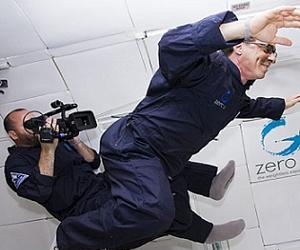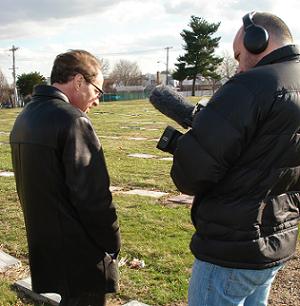Exclusive Interview With Barry Ptolemy, Director of Kurzweil Documentary Transcendent Man

Share
How do you get everyone to sit up and pay attention to the idea of the Singularity? Make it entertaining. No doubt about it, Transcendent Man is that and more. Barry Ptolemy's documentary on Ray Kurzweil explores the philosophy, personal history, and predictions of one of the world's most prominent futurists. It's a great film, and a wonderful look at the potential forces that may decide the fate of humanity. I recently had a chance to speak with Ptolemy about Transcendent Man, how making this movie has shaped his life, and his future projects. Check it out below.
[If reading about Transcendent Man isn't enough for you, don't worry. The film has been on tour for the past few weeks and was recently released for digital download. On April 14th it will be arriving at the San Francisco Palace of Fine Arts for a special screening. Tickets are still available starting at $45. Keith and I will be there in the audience, and we'd love to see you there, too. Of course, you may want to take the chance to ask Ptolemy questions yourself.
Singularity Hub: What is Transcendent Man about?
Barry Ptolemy:
"Ray Kurzweil's ideas, which in my view are the most profound ideas that we've ever had to grapple with as a civilization."
SH: What was your inspiration for making Transcendent Man?
BP:
" The first chapter [of The Singularity is Near by Ray Kurzweil, 2005] blew me away, and I was into the second chapter probably when I looked over to Felicia [Ptolemy's wife and production partner] and said, 'We need to make a movie.' I was so inspired, I was so moved, I was so enraptured, it felt to me like I had I come home to ideas that were obvious to me my whole life.
When I was 17 years old, I used to walk around and tell anyone who would listen that we had the opportunity to live indefinitely. I used that exact same language, I would say 'indefinitely' I wouldn't say 'forever', and I would use the bridge to a bridge to a bridge metaphor. Almost exactly like Ray did. To me it was obvious then that technology was speeding up. Perhaps it was because my father had me use computers at a very early age, and had computers around and I could see the price performance increasing constantly. Obviously it was still subconscious back then, but for whatever reason I was able to tell people, listen, we're going to be able to live indefinitely.
When I read the Singularity is Near, later in January of 2006, it was like every idea I came across felt so good...my ideas were finally being ratified, and they were being articulated by a genius who was able to do it in a way I could never have done and he was backing it up with so much empirical evidence and he was taking his time to go through the entire gamut of how these ideas would come to be and what the ramifications would be and it just absolutely took my breath away. And for the next several days I would wake up literally like it was Christmas morning - I cannot even describe to you - I was alive, because I enjoyed these ideas so much. I looked around the world and saw what was happening and saw what the world was going to be like twenty, twenty-five, thirty years and it just tickled me. So that was the inspiration."
Part of what strikes me about Transcendent Man is how balanced the documentary feels. Advocates for Kurzweil will watch the film and see it as a bulwark for his beliefs. Opponents will think it exposes his greatest weaknesses. Outside of the film, however, it's clear that Ptolemy is firmly supportive of the Singularity and Kurzweil's take on it.
SH: How has your personal relationship with Ray Kurzweil shaped the attitudes and outlooks of Transcendent Man. Are you still an impartial observer?
BP:
" That's a great question and this is the first time I've answered it in a public way. It's one I've wanted to answer for a long time. Many people out there think this is Ray's film. First of all let me dispel that inaccuracy. Transcendent Man is an independent film, produced by myself and my wife and executive produced by our partners, it has no relationship with Ray Kurzweil other than that he is the subject of the film. It's important to note that Ray did not see the film, not one frame or one clip of the film, until three weeks prior to the world premiere of the film at Tribeca (after it was already finalized for the event). He had no creative input whatsoever. ...Up to that point my relationship with Ray personally was completely different than my relationship [with him] after Tribeca. When I first met him, he was the subject of my film, I was his biographer. Ray was a subject.
...After it was in the can and closed, our relationship changed almost overnight. Now that we are touring together, we see each other a lot. We communicate a lot. So of course when you spend a lot of time with someone, someone you respect, of course you befriend them...I'm proud to say that Ray Kurzweil is my friend. But that did not color the making of the film in any way.
You know, Transcendent Man, any film, is sort of an institution. There's many hands touching the film. Even as powerful as I am as a director, in the editing room, there's many voices coming in and out of there. Even if I had said something like 'let's not hit Ray so hard there' it wouldn't happen. On the contrary, we were hitting Ray with everything we got! Is Ray 'a prophet that is wrong' as Kevin Kelly says? Bam! Let's take him down! Let's take Ray down. Anything I got as a filmmaker that can destroy the man and rebuild him back up that's what I wanted to throw at him. ...If we lived in a different universe and I was able to destroy his ideas, if I was able to overcome his arguments then the film would have turned out differently. ...I was not holding back, I assure you."
SH: Could you make a film about the Singularity that doesn't include Ray Kurzweil or vice versa?
" Certainly. But if you were to do that it would be like making a peanut and jelly sandwich without the peanut butter and jelly. ...The Singularity is a profound idea that when separated from Ray Kurzweil is still profound. ...Ray deserves credit however, for articulating these ideas in a way no one has before. Ray is a special figure. He came around at the right time at the right place. He is a baby boomer baby who had computers in his life at a very very early age. ...He saw what other people were probably seeing - this exponential growth in technology. ...For the first time in an empirical way looking at data we can forecast what the world will be like in 10 or 20 years. So for that reason, because Ray has done that before really anybody else in the way that he has, and given a voice to it in a way that nobody else has, and because of the power that Singularity represents, yes he will be represented as a prophet. As a Christ-like figure. He will embody that. I don't think Ray is shy, he may be uncomfortable talking about it, but I don't Ray is shy of taking on that responsibility. ...He can articulate [the Singularity] like no one else. "
As those who have seen the film will attest, a great part of the narrative focuses on how Ray Kurzweil hopes to use accelerating technologies to one day help him revive, or recreate, his dead father.
SH: How did that topic of the film arise?
BP:
" It was my choice to make a story about Ray and his father. I was the one who asked the questions regarding his father. No one had gotten that out of him before. He had never gone back to his father's cemetery in forty years. He is not as prone to bereave over his father every day as he does in the film."
Why the focus on this deeply personal aspect of Kurzweil's motivation? In a word: accessibility. The father-son narrative is a universal theme, a clear way for viewers to understand and identify with Kurzweil. Would the futurist still explore the scientific and philosophical ramifications of accelerating technology without the personal goal of saving his father? Maybe so, but as Ptolemy pointed out to me, the audience probably wouldn't.
SH: How did you approach creating a balanced film about something you believed in?
BP:
" I went into the film as an advocate for these ideas - exponential growth, radical life expansion, etc - but I knew that I had to bring in some contrarian thinkers. ...Here's what I attempted to do: I wanted to see if I could prove Ray wrong. I wanted to throw everything I could against his ideas knowing that if his ideas were as good as I thought they were that they would prevail. So we set out to interview 70 to 80 thought leaders - scientists, academics, entertainers, anybody was tangentially exposed to these ideas, or knew who Ray was, or was against these ideas - we would go and interview them."
These Kurzweil 'contrarians' are some of the best parts of Transcendent Man, because they really push you to think about a wide assortment of possible futures, not all of which would be happy for humanity. Ptolemy tells me that while not all of these interviews were able to make it into the film, he's making many of them available via deleted scenes on the DVD (release date: May 24th), and others may appear via Facebook.
SH: What's your goal here as a filmmaker?
BP:
"I want to create works that could touch people and transcend you and create a transcendent experience within you, something that gives you a peak experience so that you are able to see just a little bit beyond the valleys of your ordinary life."
SH: Yet Transcendent Man isn't an art house project. It's very watchable, and Kurzweil comes off as someone you can really relate to.
Be Part of the Future
Sign up to receive top stories about groundbreaking technologies and visionary thinkers from SingularityHub.


BP:
" One of my objectives was to create a film with a lot of momentum, a film that's to entertain ultimately, because these messages are powerful, these ideas are powerful. But if you have a bitter fruit hanging on a tree, no animal is going to eat it to disperse those seeds, just the same as these seeds of knowledge won't be dispersed from a film that is lacking in entertainment value. Entertainment is often dismissed but it's very very important. "
SH: How do you want Transcendent Man to impact your audience:
BP:
" I feel that it's important for us right now at this juncture, as Ray says, to talk about important things. ...There's a lot that's going in the world that's actually very good. ...The reality is that if you look at the world exponentially, things aren't static. ...I think it's important for people to understand that going forward that just because we have a front row seat on all the things that ail us in the world, it doesn't mean the world is becoming a worse place. The inverse is true. It's becoming a greater place because we have a front row seat with 24 hour cable news outlets and sites like SingularityHub that let us know what's going on anywhere in the world. A movie like Transcendent Man just reaffirms what we actually know as a species - that the sun's coming up tomorrow and we can put another foot forward. We've been doing that since the dawn of time. [Quoting Kurzweil]: 'We are the species that has transcended our limitations and broken boundaries. We do it all the time.' We think of technology just being your iPad or Facebook but the truth is that technology goes way way back. Our society itself is a technology.
Animal husbandry is a technology. Agriculture. A Shakespeare poem is a form of technology. And when you see it that way you understand that this has been the human-machine civilization for a long long time. There's no where you can go in the world that's separated from technology. ...This is our technology here to benefit us.
When we have a front row seat to problems all over the world - like the Gulf oil spill - we focus our minds on these challenges to overcome them as fast as we can. ...We focus insanely, immediately, and we want to solve them. Nothing has the scalability like technology to solve these problems.
...I'm very very hopeful for our future in just 25 to 30 years from now. I think that all of us will have the ability to rise up in our hierarchy of needs and become more creative and self actualizing. That is our destiny as a human species - all of us to become creative together, not to worry where our next meal is coming from. ...What's the ultimate message of Transcendant Man? To install that kind of hope."
SH: How has creating Transcendent Man and promoting it for the past few years affected your views on the future?
BP:
" It has only strengthened my convictions. Not only are we on track to see the Singularity happen, but that Ray is the MOST intelligent, wisest sage that we can possibly have on our planet right at this moment. And I'm not exaggerating. You know all his accomplishments but if you spend time with him - his emotional intelligence, the wisdom is so powerful - and he has someone who has given a lot of thought to these ideas. I just can't think, in all of human history (and I know I'm being ridiculously effusive) going all the way back to Aristotle, who has articulated, given a universality, to our species more than Ray Kurzweil?"
With Transcendent Man wrapping up its tour this year, and seeing widespread digital and DVD release, Ptolemy will soon move on to future projects.
SH: Are there any more documentaries about futurists on the docket?
BP:
" [Laughs] No...However, I will make films that touch upon Singularity, and technology, and what the world will be like in the next few decades. I would rather paint a more hopeful picture rather than a dystopian picture. ...One [of the upcoming projects] is a metaphor about the Singularity but it's a narrative feature film, and I can't say anything more than that."
I first saw Transcendent Man at its world premier in the Tribeca Film Festival in 2009. Before I spoke with Barry Ptolemy a few weeks ago, I had a chance to watch the slightly revised final cut that is now on tour. Honestly, I couldn't tell you that I even noticed the seven minutes that had been removed. The changes of the film are slight, but the changes in the world are pretty profound. We have Watson winning on Jeopardy!, Google showing off its robot car, and Kurzweil is starting to get some major press from the likes of Time and USA Today. He and Ptolemy were recently on Charlie Rose talking about Transcendent Man as well. Watching the film in 2011, the vision Kurzweil presents for the Singularity seems less like science fiction and more like a weather forecast.
Transcendent Man is becoming one of the defining films about the Technological Singularity and the man who stands at the center of the community that discusses it. I highly encourage you to watch it, either with a download (starting at $5), with a DVD ($20), or by coming out to the April 14th screening in San Francisco. The world may still be deciding if Ray Kurzweil is a genius or a nutcase, but Transcendent Man is good evidence that Barry Ptolemy is almost assuredly the former.
I'll leave you with the trailer...looks pretty cool doesn't it?
[image and video credits: Transcendent Man/Ptolemaic Productions]
Source: barry ptolemy
Related Articles

This Week’s Awesome Tech Stories From Around the Web (Through December 13)

New Immune Treatment May Suppress HIV—No Daily Pills Required

How Scientists Are Growing Computers From Human Brain Cells—and Why They Want to Keep Doing It
What we’re reading

